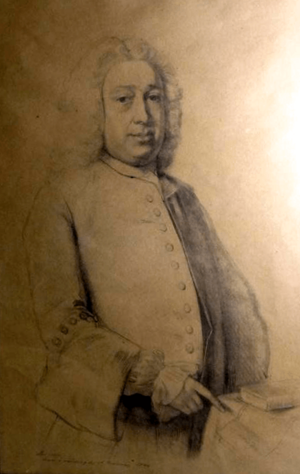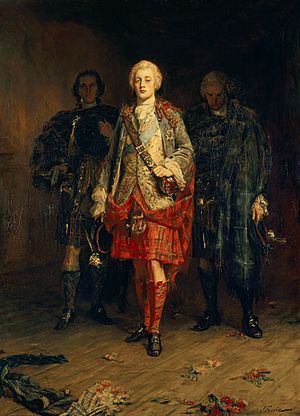Sampson Gideon facts for kids
Quick facts for kids
Sampson Gideon
|
|
|---|---|

A portrait of Sampson by Benjamin Long
|
|
| Born | February 1699 |
| Died | 17 October 1762 (aged 63) |
| Other names | Sampson Abudiente |
| Occupation |
|
| Known for | Financing suppression of the Jacobite Rising of 1745 |
Sampson Gideon (born February 1699 – died 17 October 1762) was an important British banker and generous helper of others. He worked in London during the Georgian era, a time when kings named George ruled Britain.
Gideon is best known for helping the British government, led by the Hanoverian family and the Whig political group. He gave them money to stop the Jacobite rising of 1745, a rebellion that tried to bring back the old royal family. After this, he became a trusted advisor to the government. He also supported a law called the Jewish Naturalisation Act 1753, which helped Jewish people. A historian named James Picciotto called Gideon the "Rothschild of his day," meaning he was very powerful in finance.
Contents
Early Life and Family
Sampson Gideon was born in London. He was the second of five children. His father, Rowland Gideon, traded goods in the West Indies, which are islands in the Caribbean Sea. His mother, Esther de Porto, came from a family that bought diamonds in India.
Sampson's family, the Abudientes, were Sephardi Jews. They originally came from Portugal. They made a lot of money from growing sugar cane on plantations in the West Indies. These plantations relied on the forced labor of enslaved Africans and European indentured servants.
After moving to London, Sampson's father, Rowland Gideon, became a "Freeman of the City of London." This meant he had special rights to trade and work in the city. He was likely the first Jewish person to get this status. Rowland was also involved in his Jewish community. He was the Treasurer of the Bevis Marks Synagogue, a very important Jewish place of worship, when it was first built.
His Work in Finance
Sampson Gideon started his career at age 20. He began by buying and selling things like lottery tickets and government investments. By the 1730s, he was dealing with investments from Britain, the Netherlands, and France. He also worked with marine insurance, which protects ships and their cargo.
During the War of Austrian Succession (1740-1748), Gideon became even more important in finance. He helped raise money from the Jewish community to support the British Army. He became a key advisor to the government and the Bank of England on big money matters. His wealth grew a lot: from £1,500 in 1719 to £350,000 in 1759.
Gideon started his business with £1,500 he inherited. By 1729, he was a sworn broker, meaning he was officially allowed to buy and sell for others, with £25,000. He also worked as a middleman in the metal trade with the East India Company. He was one of several Jewish financiers who specialized in this area.

One of Gideon's most important actions happened during the Jacobite rising of 1745. This was when Charles Edward Stuart, also known as Bonnie Prince Charlie, tried to take back the throne for the Stuart family. He had help from the French. When he landed in Scotland in July 1745, people in London panicked. Many people rushed to take their money out of banks, especially the Bank of England.
While others were selling their government investments in fear, Gideon calmly bought as many as he could. He also supported the Bank of England. He advised the government on how to get a new loan and even lent a lot of money himself. This helped calm the situation. By the time the Jacobite advance stopped, Gideon had doubled his wealth. His calm actions and financial help were a big reason why the government stayed in power.
His Role in Politics
Sampson Gideon wanted his family to become very important in England and own large estates. However, at that time, it wasn't clear if Jewish people could legally own land in England. Jewish people had only recently been allowed to live in England again after being banned for centuries.
Also, people who didn't follow the Church of England, including Jews, couldn't hold government jobs, become lawyers, or vote. Because Sampson Gideon had helped the government so much, he felt confident enough to ask them for a new law. He lobbied for the Jewish Naturalisation Act 1753. This law made it easier for Jewish people to become British citizens.
Later Life and Death
Sampson Gideon died in October 1762, at the age of 63, from a condition called dropsy. He had built a huge fortune of £350,000. He left £1000 to the Sephardi Jewish community in London. He asked to be buried with honor in their cemetery.
In 2005, a group called the Bexley Civic Society restored a memorial to Sampson Gideon. It is located near a church in Belvedere, London. A plaque there tells a short history of his life. It says he was a "financier of nationwide renown" and that the British government relied on his wealth and advice. It also mentions that his descendants include important figures like Hugh Childers and Erskine Childers.
Family Life
In the 1740s, Sampson Gideon married Jane Ermell. They had three children. His son, also named Sampson Gideon, was educated at a famous school called Eton College. The son later became a Baronet in 1759 and then a Baron in 1789, which are special titles of nobility.
The elder Sampson Gideon wanted to be a Baronet himself, but he was not given the title because he remained a practicing Jew. However, his son and two daughters were raised in the Church of England, like their mother. Because of this, the government eventually gave the Baronet title to his son instead.
Sampson Gideon's children included:
- Sampson Eardley, 1st Baron Eardley (1744–1824), his son.
- Susanna Gideon (born 1731), his daughter.
- Elizabeth Gideon (died 1783), his daughter, who married William Gage, 2nd Viscount Gage.
See also
 | Misty Copeland |
 | Raven Wilkinson |
 | Debra Austin |
 | Aesha Ash |

